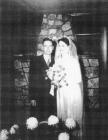14
1946. Redwater May Day Celebrations at the Old Chicken Coop School. Mickey Boston front row centre.Circa 1946
Redwater, Alberta, Canada
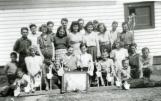
15
Mickey Boston continued recounting his school days in Redwater."When I was a kid I started school at the old Ufford School that was about a mile south of town. We would cut across the field and walk over the snowdrifts. There were about six or seven of us walking out to school. When it was very cold Mr. Malowany would drive us to school. When they moved the school into town it was better. It was just down and across the street from our store. I played a lot of sports when I was a kid and I still play old time hockey. I would come home late and have to stay up and do homework till 2 in the morning. I would be late getting up and would rush around. When I heard the bell I would race out the door and jump through the wires of the fence and skid into the classroom. Old friends still laugh at that today. I sort of looked like Dagwood, in the cartoons, racing out to work."
16
Three old street cars used as offices during the Redwater oil boom.circa 1948
Redwater, Alberta, Canada

17
Mickey Boston continued to recall his memories of early Redwater and the oil boom."There were only about three stores in town, ours was the biggest. Over the years my Dad and Grampa would carry people during the bad years. They were very well liked in town. Most of the oil companies dealt at our store. It was really something when they would come in and buy 3 or 4 big cases of bread or 3 quarters of beef at a time. We also had the telephone exchange in our store. Before the boom there were only four phones in town. When the boom came we were so busy with the telephone exchange. It kept us going from 7 in the morning right up till midnight. The tool pushes would come in and call places like Texas and all over. We couldn't handle it anymore so they moved the telephone exchange to a new building beside the Royal Bank.
"When the oil companies first came there was no electricity, running water or gas in town. Chernichan's Garage had a power plant so there were only about three or four lights in the whole town. Only four people owned vehicles and everyone used horse and wagon back then. Highway 28 wasn't paved and it was nothing but pot holes, rocks and boulders. The turn off two miles west of Redwater was known as suicide corner. They paved the highway but it was years before they paved the short stretch coming into town.
"Imperial couldn't find a place for the office so they moved into Royer's chicken coop beside the egg grading station. There was no place to stay and they even moved in the old wooden streetcars from Edmonton and also used tents. We had four guys staying in the basement of the store. It wasn't very nice down there and when it rained it would flood, but they were happy to have a place to stay. Some guys even stayed in our granary and garage out back.
"It was pretty busy back then but the oil boom was good for everybody. There was more business and more work for everyone. It was the end of the hard times for Redwater."
19
One entrepeneur to come to Redwater at the height of the oil boom was newlyweds, Alice and Jim Lukes. They came to Redwater in 1949 and opened the first drug store in town. Jim commented on his early years in Redwater."We bought the land for the drug store from Horbals, who owned a grocery store a couple of lots down the street. Mrs. Horbal didn't want to sell the land as she wanted the land for her garden, right there on main street. Mr. Horbal sold us the lot mainly because he wanted to show his wife that he was the boss.
"I met my brother in law Clive Brown in the café with a contractor by the name of Fred Karstensen, and he drew up a plan for the building on a paper napkin. We came back the next weekend and he had the building all up. There was no basement. We banked earth around the perimeter but it was still cold. The temperature that first winter was 40° below for an extended period of time. We only lived there for three years in the back of the drug store. Alf Armstrong was our first store manager. Bud Hubbard and his wife Grace, managed for awhile and Malcolm McKay was the final manager the one who bought the store in 1962.
"I served, briefly, on town council. We curled every week and had many friends. Mr. and Mrs. Sather had a ladies clothing store near the Royal Bank and their son Glen used to buy penny candy in the drug store. Glen became a professional hockey player and coach. He is presently GM of the New York Rangers and has been for years."
20
A new drug store and clothing store built during the oil boom era.Circa 1949
Redwater, Alberta, Canada
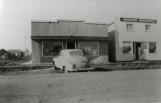
21
Jim and Ann Ewasiw at the second post office added on to their home.Circa 1949
Redwater, Alberta, Canada
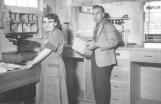
22
The post office was taxed to the limit with so many people clamouring to get their mail. Jim Evasiw, and his wife Anne both worked at the post office at that time. Jim commented on what the post office was like during the boom time."People would start coming in about 11 or 12 noon, to get their mail. There would be so many of them, if there were three or four Smiths in the post office then we would throw out all the mail addressed to Smith and let them sort it themselves. Sometimes I would have to stand outside the post office to hand out mail because it was too crowded inside.
"Before the oil boom we would get one or maybe two bags of mail a day. Sometimes in the summer we would go to pick up the mail at the train station and bring it back in a wheelbarrow. There were only about 80 people in town if you counted all the cats and dogs. After so many people moved into town we would get 15 or 20 bags of mail. We were working until 10 o'clock at night every night. Finally we had enough, I called the District Manager and told him unless he came out the next day we weren't opening the post office. He came out that next morning and could see how busy we were. He told me to go and hire some girls to work for us. We managed in that small post office for some time and then they built a bigger one."
24
Jim and Ann Evasiw's daughter Claudette (Evasiw) Stetsko commented on the early days in the post office and growing up in Redwater."It's funny the things a person remembers about an event. I was five years old when the boom came. I can remember Mom and Dad handling the volumes of mail that flooded the tiny post office that was located in a small add-on on the east side of the house. The mailbags were strewn on the floor because there was no time to sort the mass of letters. This little office soon gave way to a larger building that was connected to the west side of the house. When the train came in, Dad would drive his small pickup along side the mail car and load as many bags on it as the truck would hold. It was not long after that they were able to get help in the office because of the increased business. Later on the mail truck replaced the mail coming by train and if the mail truck came at night, Dad had to be there to help unload.
"The post office was located at the north end of main street, and it seemed that when someone new came to town and wanted information, they would come to the office. The post office at that time would be open 6 days a week. Because of the hours oil people kept, they would still come to the house in the evenings, and even on Sunday and ask if they could get their mail, and Dad would often oblige. Even with all this work, Mom and Dad managed to plant a sea of flowers around the yard. People were always asking if they could come and take pictures of the place. Because the town was booming, land was purchased from my grandfather, Nick Ziniuk, to build the "town site" for new people coming in. The town was a hive of activity. The streets were still gravel, and every spring main street became an obstacle course of potholes and mud holes. I can still remember the milk wagon, (I don't remember who the milkman was) pulled by a horse that knew every stop, and the milk bottles with the plastic tokens left at the door. In the winter, if the milk bottles were left outside too long, the milk would freeze and pop the paper lid."
25
By 1951 Redwater's post office was housed in a building of it's own.Circa 1951
Redwater, Alberta, Canada
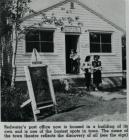 Credits:
Credits:Imperial Oil Review, Vol. 35 No. 1 February March 1951
Imperial Oil Fonds, Glenbow Museum, Calgary, Alberta
26
The new Red and White Store the school can be seen in the background.Circa 1949
Redwater, Alberta, Canada
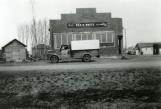
27
Claudette (Evasiw) Stetsko continued to recall her early memories."The Red and White Grocery store was built and operated by my uncle Mike Ziniuk, and was originally located where the glass shop is today. It was eventually moved onto main street and located near where the present drug store stands. The sidewalks were all wooden, and in the summer kids would fish in between the boards to retrieve any coins that rolled down there. In the summer we would also wait for the ice cream truck to come to Maskaluk's confectionery, because the excess dry ice would be tossed onto the street to melt and was a treat to play with. We learned very quickly the hard way on how to handle it. Kids had to use their imagination for play and in a small town that was easy. The field behind the post office had quite a large slough there, and we constantly looked for old boards to make a raft. One time we found a door and it was a constant contest to see who could get to the slough first to get the door. The whole town watched the children, which was positive in a sense that you knew that if you did something wrong, your parents would find out."
"Even though everyone worked hard at their jobs, they still had time for entertainment. The bowling alley was constantly busy with men and women's bowling. I can remember being paid 15 cents a game to "pin set". We would sit on a ledge just above the pins, and as one person threw their balls, we would jump down and reset the pins on the marked spots and then put the balls in the chute to return back to the bowlers. This job was quite a challenge especially when you had someone throw "speedballs" and the pins would fly everywhere.
"The curling rink was always busy, and bonspiels would draw people from all around. Dad curled for many years and his team was the first team to make an 8-ender in the curling rink. The rink had natural ice, and if we had a spring thaw outside, there was a spring thaw inside the rink.
"The people worked hard and they played hard. Kids lived their dreams in their imaginations and felt safe, even though so many new people were in town. Life was so much safer then. The blend of oil people with the farming community gave children the chance to experience both ways of life and opened up the world for us."
